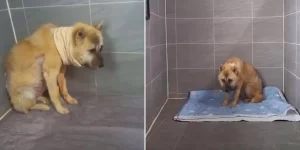
Meet Fortunate!
Fortunate, a courageous soul who narrowly escaped a grim destiny at a close-by animal shelter.
Regardless of the adversity, a ray of hope pierced by. A well-timed rescue mission spared Fortunate from the upcoming risk of euthanasia, bestowing upon her the apt identify, Fortunate, in recognition of her fortuitous accident.
Upon her arrival on the veterinary clinic, Fortunate’s state was dire… The following days had been marked by her steadfast restoration, as she slowly regained consciousness and launched into the journey to bodily recuperation.
All through her restoration course of, Fortunate exhibited a cautious demeanor, a mirror of her earlier traumas. Nevertheless, every new day introduced minor triumphs: her willingness to simply accept medical remedy and a burgeoning curiosity about her setting.
Fortunate remodeled from a distressed creature, haunted by concern, to a confident pet, wanting to discover the boundless pleasures of existence.
Fortunate’s beforehand subdued spirit flourished, radiating happiness and serenity. Right now, she serves as a logo of hope, exemplifying the transformative energy of empathy and perseverance.
We categorical our profound gratitude to all those that contributed to Fortunate’s outstanding restoration. Your steadfast dedication has been instrumental in her journey. To Fortunate, we want a future full of happiness and endless pleasure, as you revel within the consolation and safety of your new dwelling.
Watch the video under for the total story!
Youtube video
some healthy eating for dogs:
Monitor Urinary Health:
Certain dietary factors, such as water intake and mineral content, can impact your dog’s urinary health. Consult with your veterinarian to select a diet that supports urinary tract health and monitor your dog for signs of urinary issues, such as frequent urination or straining.
Practice Safe Food Handling:
Handle your dog’s food with care to prevent contamination and foodborne illness. Wash your hands before and after handling food, clean food and water bowls regularly, and store dry food in a cool, dry place to maintain freshness.
Consider Lifestyle Changes:
As your dog ages or undergoes changes in activity level, their dietary needs may evolve. Be prepared to adjust their diet accordingly to accommodate these changes and ensure they continue to receive optimal nutrition.
By implementing these strategies and staying attentive to your dog’s individual needs, you can help promote their overall health and well-being through healthy eating habits.
Supervise Treat Consumption:
When giving your dog treats, be mindful of the portion size and frequency. Treats should only account for a small portion of your dog’s daily caloric intake and should be given as rewards for good behavior or training achievements.
Consider Home Cooking:
If commercial dog food options don’t meet your dog’s needs or preferences, consider home-cooked meals prepared with fresh, whole ingredients. Work with a veterinary nutritionist to ensure that your homemade meals are balanced and provide all the nutrients your dog requires.
Prevent Food Theft:
Prevent food theft by storing your dog’s food in a secure location that is inaccessible to other pets or wildlife. This reduces the risk of your dog consuming inappropriate or potentially harmful foods.